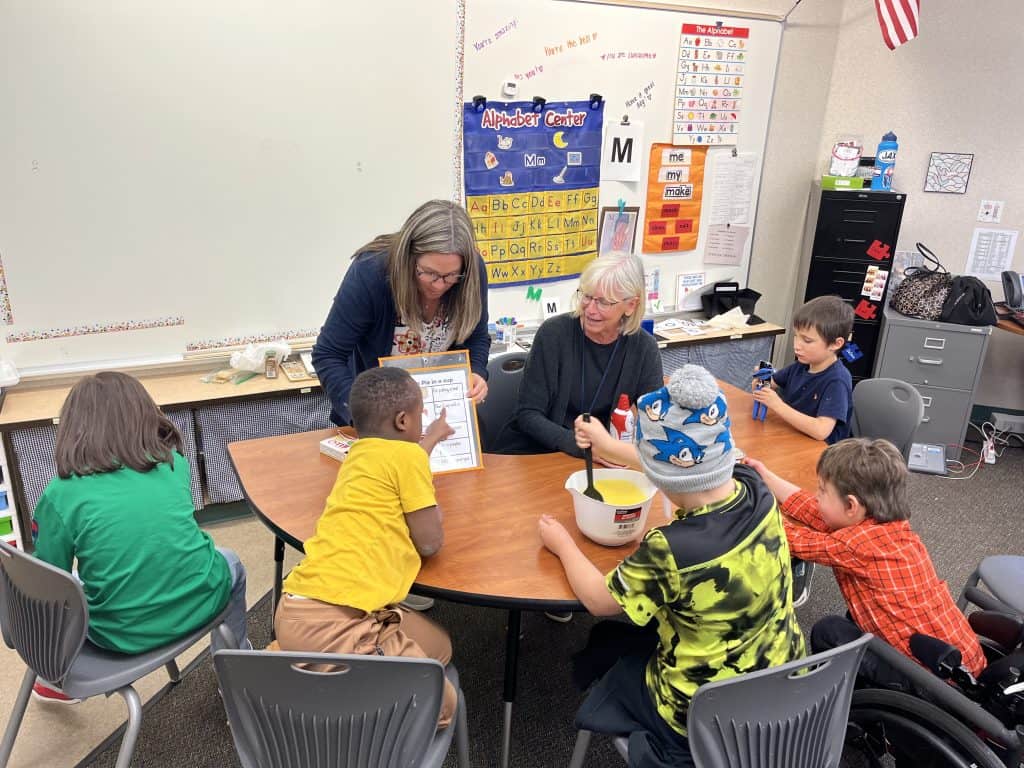
Food is a part of our everyday lives and it’s a powerful way to connect with students. There are so many skills that can be learned from cooking and exploring food. From fine motor and language skills, to math and functional skills. Cooking and trying new foods creates a shared experience and forms an instant bond between staff and students.
The term functional skills refers to skills an individual needs in order to live as independently as possible. Those skills also describe the routine activities of everyday life, such as communications, behavior, social skills, and daily living skills.
District special education staff are tapping into those functional life skills in a fun way by having students prepare snacks. Root Beer floats, turkey sandwiches, toast, smores, and pumpkin pie in a cup are just some of the snacks that staff and students are whipping up on a weekly basis.
Last year, Florence Landblom, occupational therapist, started cooking with her Significant Support Needs (SSN) students at Blue Mountain Elementary and Niwot HS, and has already seen an increase in independence. She said, “I really hold a belief in doing functional activities that get students ready for their world outside of school. I want students to be as independent as possible and exposing them to functional activities, such as cooking, gives them an opportunity to increase their independence.”
Being independent in preparing meals at home can empower student growth and provide students with a sense of pride and accomplishment. There are many functional skills that go into making a snack and Landblom helps students master them all, so they can be independent in everyday life. “My hope would be that when students are at home and they want a sandwich or a snack that they’re able to make it by themselves. They need to know how to open the bread bag, open containers, learn how to spread, slice, whisk, stir, measure, and pour,” Landblom said.
During the weekly cooking sessions, students not only work on fine motor skills, they also work on important social language skills. Lindsay Spiegel, speech language pathologist, was excited to join the fun at Blue Mountain. “Flo had the class up and running and I was excited to join in because it’s a great opportunity for students to work on building language skills in a functional setting. Culturally, we connect around food and many social conversations happen over food, so it’s a natural way for students to work on speech goals in a fun, engaging way,” Spiegel said.
Special Education staff at Longmont Estates Elementary have found that incorporating a visual cookbook into their weekly sessions has helped to engage their center based autism students with cooking. Some of their students are nonverbal and may need more visual supports and the cookbook provides step by step instructions to accommodate their needs and help students communicate more effectively.
Kara Cannon, speech language pathologist explained, “For those students who have less verbal language, they can just point to an item on the sheet to communicate with us. It’s also a good way to check for comprehension and independence.”
As any parent can relate, sometimes the hardest part is getting the students to try new foods. Cannon said, “Not everyone likes what we make, but they’re encouraged to try it and if they’re not yet comfortable tasting it, all they have to do is smell it. The key is to repeat recipes so that with each exposure the student will eventually try it.”
In addition to the cookbook, special education staff at Longmont Estates have implemented a cooking feedback form where students get to be food critics and rate snacks by giving it a thumbs up or down for taste. Students also get a chance to write a review and give the snack one through five stars. Patty Toillion, occupational therapist, said the cooking feedback form is a great way to check for comprehension after the activity. “Students not only write descriptive words of what they made, they’re also using important fine motor skills to write their answers. I love that through cooking, students are learning functional skills and gaining lifelong skills in the process.”
Cooking not only helps students with their life skills, it also helps them connect with staff and other peers. Cannon said, “I love to see their social interactions with each other. I work with students one on one a lot of the time, so it’s nice to be able to see communication skills within a functional activity.”
